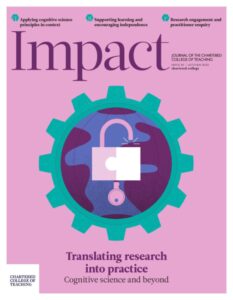Bridging the gap from current to effective professional development: A journey towards instructional coaching
Written by: Imogen Fletcher-Blackburn

9 min read
Imogen Fletcher-Blackburn, Assistant Principal for teaching and learning at Trinity Academy, London
There is strong evidence to suggest that instructional coaching can improve teacher instruction, the quality of teacher–child interactions, pupil behaviour, motivation and attainment (Kraft et al., 2018; Basma and Savage, 2018; Allen et al., 2011, 2015). I was first introduced to instructional coaching in 2019, when I joined the Teacher Education Fellows with Ambition Institute. It created my long-term mission statement to establish a professional development programme that was one-to-one, frequent, sustained, context-specific and focused on individualised behaviours (Kraft et al., 2018). In Impact issue 13, Steve Farndon wrote an article titled ‘Implementing instructional coaching: A guide for school leaders’ (2021). This article follows my honest experiences of doing just that.
How do I even start?
This was a question that plagued me for a long time. Within my context, a relat
Join us or sign in now to view the rest of this page
You're viewing this site as a guest, which only allows you to view a limited amount of content.
To view this page and get access to all our resources, join the Chartered College of Teaching (it's free for trainee teachers and half price for NQTs) or log in if you're already a member.
- Allen JP, Hafen CA, Gregory AC et al. (2015) Enhancing secondary school instruction and student achievement: Replication and extension of the My Teaching Partner-Secondary intervention. Journal of Research on Educational Effectiveness 8(4): 475–489.
- Allen JP, Pianta RC, Gregory A et al. (2011) An interaction-based approach to enhancing secondary school instruction and student achievement. Science 333(6045): 1034–1037.
- Basma B and Savage R (2018) Teacher professional development and student literacy growth: A systematic review and meta-analysis. Educational Psychology Review 30(2): 457–48.
- Deans for Impact (2015) The science of learning.
- Ericsson A and Pool R (2016) Peak: Secrets from the New Science of Expertise. Boston, MA: Houghton Mifflin Harcourt.
- Farndon S (2021) Implementing instructional coaching: A guide for school leaders. Impact 13: 16–19.
- Feldon DF (2007) Cognitive load and classroom teaching: The double-edged sword of automaticity. Educational Psychologist 42(3): 123–137.
- Kraft M, Blazar D and Hogan D (2018) The effect of teacher coaching on instruction and achievement: A meta-analysis of the causal evidence. Review of Educational Research 88(4): 547–588.
- Lemov D (2014) Teach like a champion 2.0. Hoboken, NJ: John Wiley & Sons
- Rosenshine B (2010) Principles of instruction. Educational Practices Series 21. International Academy of Education.
- Sherrington T (2019) Rosenshine’s Principles in Action. Woodbridge: John Catt.
- Willingham DT (2009) Why Don't Students Like School? A Cognitive Scientist Answers Questions About How the Mind Works and What it Means for the Classroom. Hoboken, NJ: John Wiley & Sons.
5
1
vote
Please Rate this content
Subscribe
Please login to comment
0 Comments
Inline Feedbacks
View all comments










